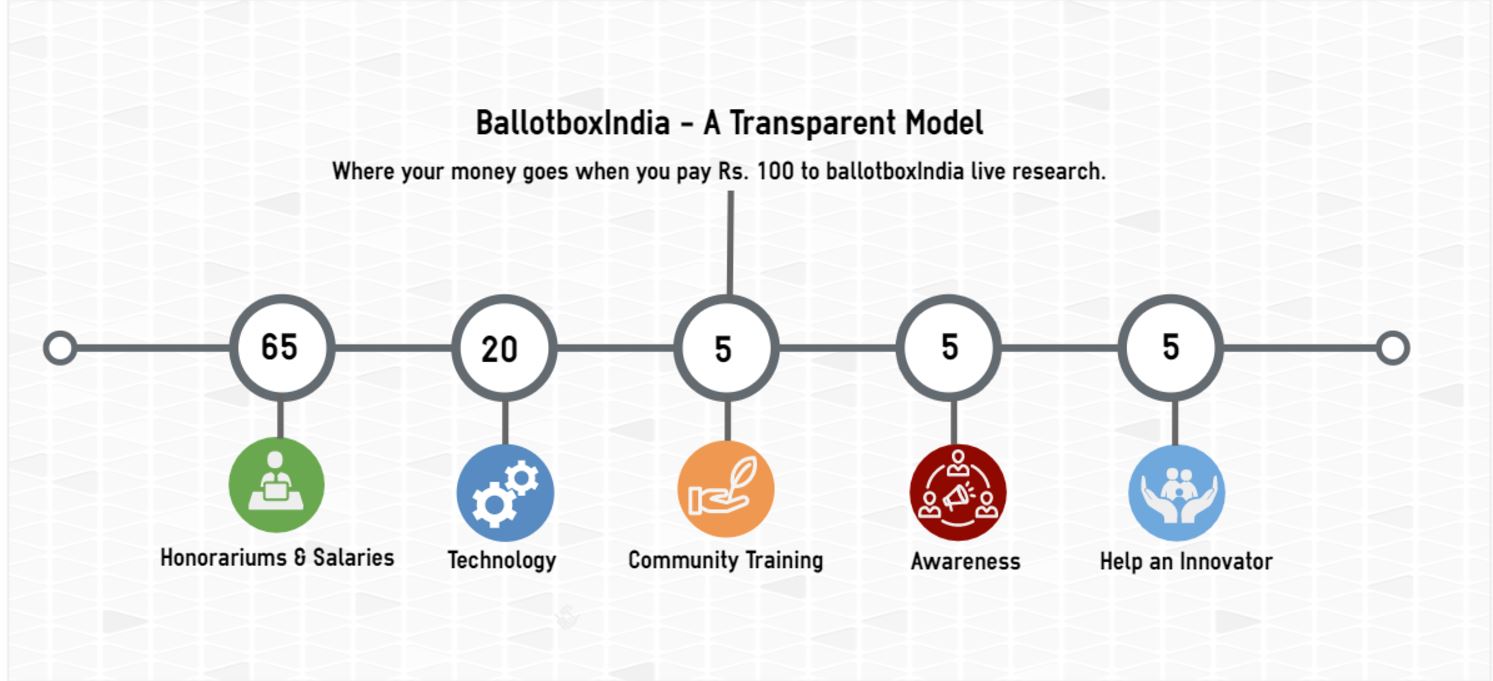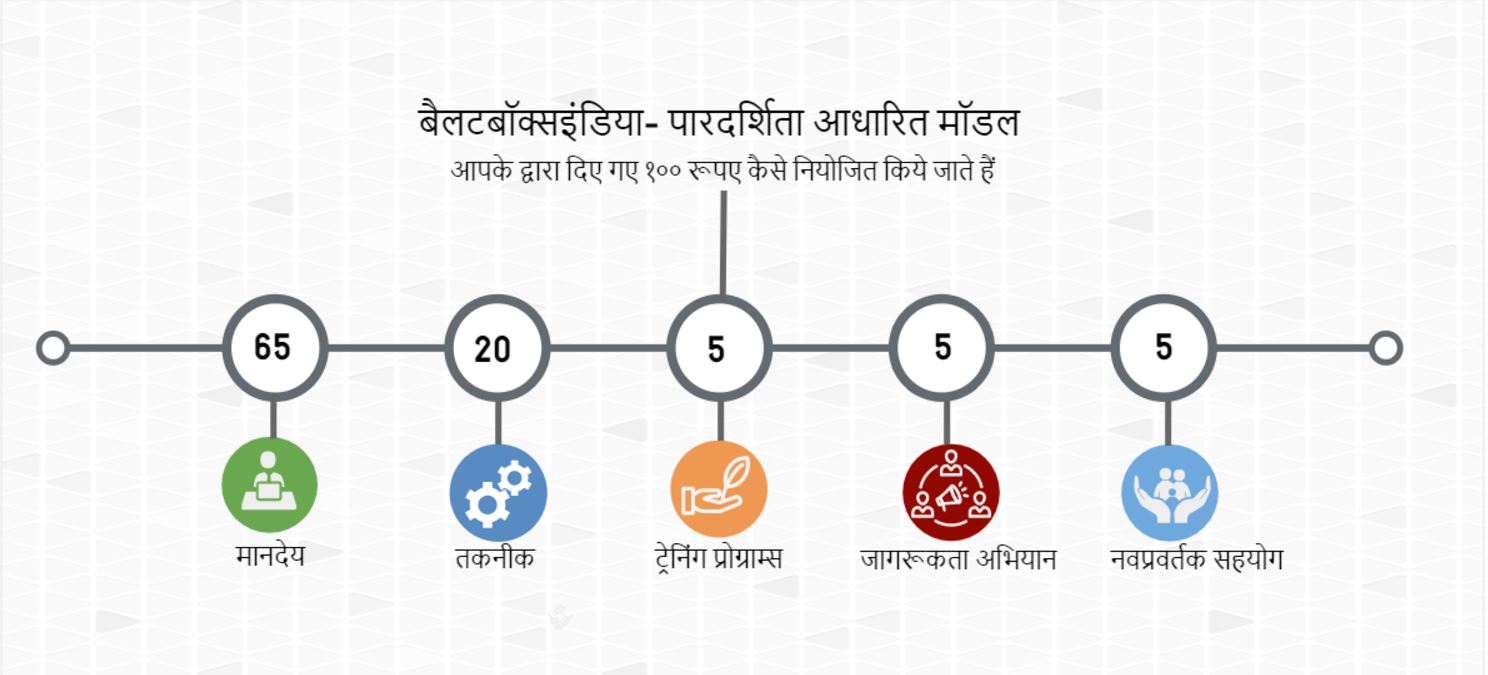The RTI act 2005 of India started with much fanfare and hopes of clear and clean flow of information to the citizens of India, but even after close to 10 years of its roll out we find it’s nowhere close to providing a basic framework for efficient, consistent, reliable and analyzable information dissemination.
This live action research aims to make the RTI systems across states and center consistent in their functioning and also improve their information quality,digitally connected, intuitive, self serviced and seamless.
The core tenets of an effective RTI Act 2005 implementation- based on our interactions with the RTI system should be:
1. The Right to Information ecosystem should be Digital, Consistent, Standardized and traceable with minimal efforts. It should have pan India information interfaces which should be interconnected thru a central system.
2. Information should be available fully in content and format. RTI requestor should get the exact information he/she asks for, in totality - And not the abridged/incorrect/irrelevant information/data the Governing Authorities may want to show (Except under exceptional circumstances, such as National Security)
3. A strong and swift feedback mechanism, not only for PIOs (Public Information Officers) on the information provided but RTI seekers as well- if information asked for repeatedly violates RTI 2005 guidelines in spirit.
We see that the Central Ministries are accessible via http://rti.gov.in - which at least provides a standard interface to interact with Central government machinery. This website works well in terms of ease to use and provides a great payment gateway. An RTI, once ready to file takes only a few minutes- A standard payment of Rs. 10 via net banking or credit cards sends the RTI electronically to the concerned PIOs, and a ticketing mechanism assigns a unique reference number to each RTI so that it can be tracked later. However, there are a few shortcomings as well, due to a non-reliable feedback mechanism. Below are a few examples:
-If a PIO is inclined he can keep spinning you in loops - And NOT provide the sought information even thru the first and then second appeal with CIC. This is a waste of time, resources, and energy as per our personal experience.
-The PIOs first response most of the time is to deflect the actual information asked OR provide canned or partial or no information at all. Information seeker has to be persistent and crafty to get the complete information out in the proper format or use different channels.
- An Electronic RTI, once filed, may leave a paper trail which stretches long. It can go to multiple departments, where multiple ticket/file numbers are assigned – And the requester has to keep a track of potentially 100 speed-posts coming his way that was copied to various departments (yes this has happened for real). This is a classic case of the inadvertent data dump, inefficient use of public money, paper and efforts.
Notwithstanding the above flaws, the current system still provides a basic platform to interact with central government departments, which is somewhat efficient. If you are patient, persistent and respectful, will get something out of the system. The gaps might be due to the difference of world view between RTI seekers and PIOs, but still, there are some honest efforts.
States – Why so inefficient?
We need to open another action group on http://rti.gov.in feedback mechanism but before that, let's talk about states.
As we know, the last mile responsibility for public welfare and benefits lies with states. As central government devolves more and more responsibilities to state departments, it becomes very important that the states implement a robust and standardized RTI mechanism, at least at par with the central RTI system (http://rti.gov.in)
When we compare the central government RTI mechanism with the state level RTI mechanism, the differences are jaw dropping. For example, before filing a state department RTI you need to -
1. Find out who are the state department's PIO and their address.
2. Find out the prescribed fee for the state. In most of the cases, the RTI would be summarily rejected without any intimation if the prescribed fee is inadequate.
3. Find out if there is a specific form you need to fill up, rather than sending the request on plain paper. Again, the RTI may be rejected if not given in proper format (even if it is very clear and complete)
4. Go to post office and buy postal orders of the prescribed amount, to be sent along with the RTI application. Most of the post offices are out of postal orders, the ones which have available postal orders dispense them only during a window of a couple hours per day- so one needs ample social engineering skills , along with patience and persistence to strike the bingo of postal order.
5. Speed post, or registered post the RTI request to the concerned SPIO (State Public information Officer)
6. Since there is no feedback mechanism, you have to track and wait for another letter or response from SPIO, while the SPIO may choose to find a technical flaw (e.g. fee was not prescribed or you did something with the postal order or format of RTI was not correct) to simply reject the RTI and sit quite. Good luck with follow ups and the back and forth. Again, be very respectful and persistent and you might get something out - if lucky or if information is trivial.
How is it impacting us? (Answer – At least Rs. 1557 Crores every year and growing!)
As per rough estimates a single RTI for a state takes close to one man day to file and another to follow, track and get the physical postal mail back and forth- leaving alone the added efforts by postal department, the carbon foot print of paper used, transportation, Public and RTI requester's money used on postal mails.
India's per capital income as per World Bank data is $ 5670 in 2014 on PPP (purchasing power parity rate) Based on 242 working days it comes to $23.5 (Rs. 1494) per day of productivity loss. If we add $2 conservatively on postal and manual efforts, postage, green costs in moving the physical packets around (And we can't monetize the personal cost on keeping calm and respectful all this time) it's $49 ($23.5 x 2 Workdays + $2) per RTI. This is roughly equivalent to Rs. 3115 per RTI filed.
As per CIC (Central Information Commission) data, the number of fresh RTI’s filed and the Number of carried over RTI’s (from previous years) has been steadily increasing over the years. Considering the fact that an average Indian citizen interacts with the government agencies frequently and that the RTI is the easiest way for him/her to get clarifications/data from such authorities, we can only see these numbers increasing as more and more people get aware of the empowerment that RTI Act. Grants them. Even if we conservatively take the figure of 1% of the Indian population (More than 1 crore) which will be using this facility in the (very near) future to sought information from various agencies, the Government machinery seems awfully unprepared to handle such volumes. As the inefficiencies will further increase, the total monetary burden in terms of productive GDP days lost and unnecessary resource wastage will take humongous proportions.
To put things in perspective, News media reported during 2013-14 that 50 lakh RTI requests were filed across central and state departments. Therefore, the total monetary effort comes to a whopping $245 Million (Rs. 1557 crores) cost on GDP due to a broken system of filing state RTIs (without looking at feedback mechanism, information quality etc.), that too on a very conservative basis.
The above cost equals 50% the overall budget of Kendriya Vidyalayas in India, means we could operate KV schools for one year for close to 5 lacs more kids in India with this kind of funds (1174819 kids were enrolled into KV system in 2014 with Rs. 3000 Cr yearly budget).
So what should be done?
Now, considering we are bleeding that magnitude of financial resources due to inefficiencies, with the losses mounting year on year, our question to the state CICs are:
- Why after 10 years of RTI Act in force they have still not been able to provide a seamless, easy, transparent and standardized electronic method at least similar to or on http://rti.gov.in for all their departments.
- To keep the cost low, why can't they leverage the platform which has already been put in place by central ministries
- All the state-based nuances of different cost, format, eligibility can be coded and automated to avoid this inefficiency. Why its not done?
- Central government ministries are on electronic portal since last many years and it’s managed by NIC - the same agency which maintains state digital infrastructure as well. So developing a seamless, effective and evolving system modeled after rti.gov.in to confirm to the spirit of RTI seems easy enough task, as a basic blueprint is already in place. What are the deliberations done in this regard and if citizens of our country can expect a time bound implementation?
We at BallotboxIndia have started the efforts to bring efficiency to the last drop in the RTI system of India since a strong information flow is like a nervous system of the system which is meant for citizen empowerment.
As the first step, RTI requests will be sent to CICs of all the states - raising questions. Their responses, non-responses, and the whole journey will be shared on a public forum as respective milestones of this action group.
We would like to invite all the RTI activists, constitution experts, PIOs, SPIOs and agencies to deliberate, act and help fix this tremendous problem swiftly.
Below is the status of the state RTIs (Click on the state names for details) enquiring about their plans to put the system online either on rti.gov.in or a better easily accessible platform.
1. Haryana - Quick Positive response, not yet online but there are plans on paper.
2. Tripura - No Response after almost 3 months, reminders on the way.
3. Union Territories - No Response after almost 3 months, reminders on the way.
4. Uttarakhand - No Response after almost 3 months, reminders on the way.
5. Punjab - Fairly Quick Response. No, it's not available or any such process started. PIO is not to provide an explanation on "Why".
6. Himachal Pradesh - Fairly Quick Response. No its not available. There is no information on records to provide an answer to "Why".
7. Uttar Pradesh - No Response after almost 3 months, reminders on the way.
8. Jammu and Kashmir - No Response after almost 3 months, reminders on the way.
9. Madhya Pradesh - Response after 4 weeks, out-rightly rejected saying Rs. 10 fees was not accompanied. We are diligent about our process of paying a fee as per RTI Act 2005 via Postal Orders but not sure how to contest this claim. And that is the exact point behind digitizing this facility. Got a fresh response, they are now working on digitizing the RTI facility.
10. Gujarat - Fairly quick response, REJECTED since you paid only Rs. 10 instead of Rs. 20 as per Gujarat SIC. They could have provided information and asked for remaining Rs. 10. Again this is the exact point of this Action Group.
11. Bihar - No Response after almost 3 months. Might be busy thinking what to do with 1.26 or 2.75 Lack Crore package (Pun intended)
12. Chattisgarh - Quick and Positive Response, they have online tracking facility and will soon provide online filing facility for "Native" people.
13. Jharkhand - No Response after almost 3 months.
14. Sikkim - Quick response, Need documentary proof of being a citizen of India, rejected on technical grounds. Again the same reason this Action Group was raised.
15. Maharashtra - Response in about a month, It's transferred to IT Department Mantralay, follow up with them directly. Okay... Whom to contact is there a tracking number. Should we again send in speed post if no response after 3 months? Can I call? This one is really tricky bureaucracy.
16. Telangana - Nothing after 3 months.
17. Andhra Pradesh - Outrightly Rejected, prescribed fee not paid. We paid Rs. 10 via PO haven't been able to find what is the prescribed fee yet. Again the same problem Action Group means to address.
18. Odisha - Politely Rejected, need form A. and documentation regarding the identity.
19. West Bengal - REJECTED since there is no signature on the application. Wow... this is a new one.
20. Assam - No response after 3 months.
21. Goa - No response after 3 months.
22. Meghalaya - Meghalaya DOESN't have an online facility. Can't provide information on "Why".
23. Arunachal Pradesh - No response yet after 3 months.
24. Manipur - Fairly quick response, we don't have it yet. But it's a good suggestion and we will advice concerned department to take steps and implement it ASAP. Thanks, Manipur!!
25. Nagaland - Great Response. Yes, there is a project going on under E-District which will enable this functionality. Thanks, Nagaland!!
26. Karnataka - Request doesn't come under Section 2(f) so not considered (REJECTED). How is that even possible??
27. Tamil Nadu - No Response yet, after 3 months.
28. Kerala - Returned, Postal Orders are not acceptable form of payment in Kerala, The application fee may be remitted by way of Court Fee Stamp or by remitting the amount in Government treasury under the head of account 0070-60-118-99, or by way of Demand Draft or Bankers Cheque drawn in favour of the State Public In{ormation Officer, payable at Thiruvananthapuram. (The postal order is returned herewith).
Come on Kerala... Not you.
So apart from a couple of states like Haryana, Nagaland, Manipur and Chattisgarh, were either rejected, not responded or kept running in loops with government departments. All we were looking for was why everyone can't use a facility already in place and save some money for the nation.
We talk about Digital India and want to invite everyone to make in India. Bring development for everyone and all the other good stuff, but we can't have a working Citizen Information System even after 10 years of RTI!
Let's join hands to fix this issue. Seamless and efficient information flow is a key element in eradicating corruption, fixing issues of meritocracy, sustainable growth, and development in communities - Let's work to make this happen. Support Digital India.
What are we aiming for?
For many policy frameworks and its implementation states and center work together in tandem. Subjects like healthcare, education, civil rights, projects with environmental impact, interstate sharing of resources and much more have shared responsibility and operational boundaries, with data flowing between them.
The right to information and the whole idea and spirit of it can’t work without the seamless flow of information between center and states with a unified public view provided to the civil society.
What we propose can be listed as.
- 1. A single window system where any citizen can get registered, authenticated and allowed to access all the public information and data points in a seamless, intuitive and self-service mode.
- 2. We propose the current Agency centric approach be augmented with “Information-Centric” approach. E.g. if a citizen needs to see the project report and environment clearance conditions of Gomti Riverfront Project, he can visit the portal and search for the information, which should be made available as part of voluntary disclosure policy. Instead of finding the right department and agency, and then asking for the information in a non-standard format, and answered in an inconsistent manner.
- 3. All the department and centers should report information about their budgets, data catalogs they collect, details on projects undertaken. As a part of voluntarily disclosure policy.
- 4. Right to information fee can be suitably adjusted for the system to run on a non-profit, no-loss basis.
- 5. Departments not submitting their information in a standard format should be penalized.
If you are RTI expert and RTI activist want to actually work on making your Country better, send the details on coordinators@ballotboxindia.com
If you know someone who can make a difference, make an introduction with this effort, you can also write to coordinators@ballotboxindia.com, or fill "Contact a coordinator" form by clicking the buttons on this page.
If you have a few hours to work in your community for common good, let us know and join as a coordinator. If you have the right skill and attitude to make a difference ballot box India is the right platform.
Thanks
Coordinators@ballotboxindia.com
 tag on profile.
tag on profile.




